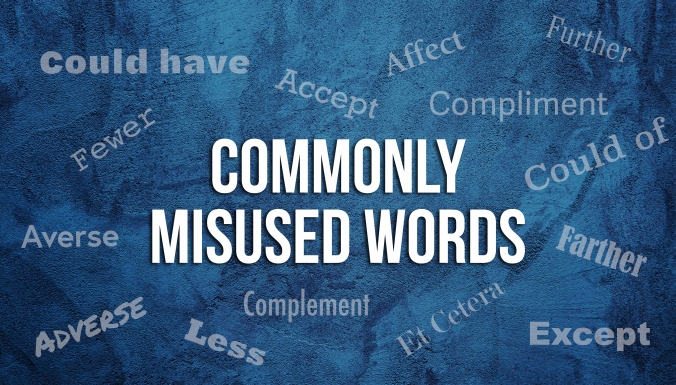By Danielle Sinon

The English language is a hard nut to crack. Even those who call it their mother tongue have trouble wrapping their minds around it at times. With so many anomalies and irregularities, it’s easy to stumble through your words. Here at Atlantic Publishing, it’s our job to read, so it’s only natural that we occasionally come across errors while we work. We’ve compiled a list of the most common mistakes to help you with your writing.
Accept or Except
These two often get confused because they sound so similar. Accept means to receive something that has been offered: “She accepted the job position.” Except means to cut something out of the picture: “He has to work every day except Saturday.”
Adverse or Averse
When you have a bad reaction or experience something negative, this is the time to use adverse. For example, “Adverse weather conditions forced them to reroute the plane.” However, if you strongly dislike something and try to avoid it at all costs, then you are averse to it. For example, “The children are averse to green vegetables.”
Affect or Effect
There are many different ways to use these words, but we’re just going to focus on the most common ones. Affect is primarily used as a verb, so you could say: “My job was affected by the recent flooding.” Effect is usually used as a noun, which would look like this: “The decor had a huge effect on the sale of the house.”
Compliment or Complement
Do you like it when someone pays you a compliment? Or is it a complement? Here’s an easy way to never get these two mixed up again: think of complement in connection with completion: “Those shoes complement that dress perfectly!” You may also think those shoes look great on the person wearing them, so go ahead and compliment them on their great taste!
Could Have
This is one of the most common mistakes out there, and it is solely based on how it sounds. When you’re talking to your friend and you tell them, “I could’ve done that differently,” it’s easy to understand how this could be misinterpreted as could of. Used correctly, this is how it should look: “You could have given her a second chance.”
Every day or Everyday
At first look, these two might appear to be the same, but that’s not the case at all! Every day is a phrase that is used to describe something that is done on a daily basis: “I wash clothes every day.” Everyday is a little different because it’s used to describe an ordinary or typical daily event: “Afternoon storms are an everyday occurrence in Florida during the summer.”
Et Cetera
While it may not be often that you write this phrase in full, it’s important to know just in case the opportunity arises. The abbreviation (etc.) is a helpful hint to remind you that it is always et cetera, not ex cetera or ek cetera.
Farther or Further
While both farther and further come from far, they are used in different circumstances. Farther refers to a distance traveled, either literally or metaphorically. For example, “He ran farther than he had planned.” Used as a verb, further means “to aid in the progress of, to promote, or to move forward.” It could be used in this way: “She had decided to work harder than ever to further her education.” But used as an adverb or adjective, it means “in addition to.” For example, “She asked for further information regarding her classes.”
Fewer or Less
Fewer refers to specific items, whereas less is used for singular mass nouns. You can have fewer puppies, friends, coins and books, but you can only have less money, time and authority.
In-Laws
Getting married brings new family members into your life — as well as a whole new vocabulary. Your husband’s parents are your in-laws, but your husband’s three sisters are your sisters-in-law, not your sister-in-laws. The same goes for brothers, parents, and any other in-laws you can think of.
Peace of Mind
You may have had the last straw with someone and want to give them a piece of your mind! But if you need some time to yourself in a calm and tranquil environment, all you want is some peace of mind.
Sneak Peek
If you want to describe a mountain that is a little bit mysterious, go ahead and say it’s a sneak peak. But if you have a surprise birthday cake that is locked away for later and you want to show someone before the party, you’ll want to give them a sneak peek.
While speaking and reading are fairly easy tasks, especially for fellow bibliophiles, writing can be a little more difficult. As long as you keep these common mistakes in mind when you begin your next project, you’ll be on your way to literary success!